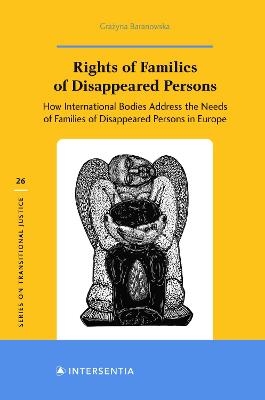
Rights of Families of Disappeared Persons, 26
Intersentia Ltd (Verlag)
978-1-83970-137-5 (ISBN)
The families of disappeared persons have an increasing number of international mechanisms through which they can attempt to address their needs. The proliferation of such mechanisms gives victims of enforced disappearance in Europe access to many different international procedures. At the same time, however, a functional analysis of the specific organs involved has shown that they respond to the needs of families to varying degrees. This results from the differences in their competences as well as those in their jurisprudence.
There is no international instrument or mechanism capable of fully satisfying the four basic needs of the families of disappeared persons. However, in Europe, these families do have the possibility to make use of various judicial and quasi-judicial means and mechanisms which - if the states involved would properly execute the judgments or cooperate with the proper bodies - could lead to the return of the remains of disappeared persons, to obtaining knowledge about their fates, and to receiving financial compensation.
The analysis covers the judgments and decisions of the European Court of Human Rights, the UN Human Rights Committee, the International Criminal Tribunal for the former Yugoslavia, the Human Rights Chamber for Bosnia and Herzegovina, the Human Rights Advisory Panel in Kosovo, as well as the activities of the Committee on Missing Persons in Cyprus, the Special Process on Missing Persons in the Territory of former Yugoslavia, the UN Committee on Enforced Disappearances and the International Commission on Missing Persons. In so doing, the book demonstrates whether, how, and based on what principles these four needs of the families of disappeared persons can constitute a claim based on international human rights law.
Grażyna Baranowska is an Assistant Professor at the Institute of Law Studies of the Polish Academy of Sciences. She previously worked as a policy advisor to a member of the UN Committee on Enforced Disappearances.
Chapter 1. Introduction to the Rights and Needs of Families of Disappeared Persons (p. 1)
Chapter 2. The European Court of Human Rights and Disappeared Persons: Broadening in Substantiating Claims and Narrowing Down Through Application of Temporal Competences (p. 37)
Chapter 3. The UN Human Rights Committee and Disappeared Persons: Approaches to the Right to Life (p. 111)
Chapter 4. International Judicial Bodies Established in Response to Conflicts in the Former Yugoslavia: Addressing Mass Disappearances (p. 133)
Chapter 5. Searching For and Exhuming Disappeared Persons: International Non-Judicial Mechanisms (p. 173)
Chapter 6. Conclusion: Addressing Rights and Needs of Families of Disappeared Person in Europe (p. 211)
| Erscheinungsdatum | 16.11.2023 |
|---|---|
| Reihe/Serie | Transitional Justice ; 26 |
| Verlagsort | Cambridge |
| Sprache | englisch |
| Themenwelt | Recht / Steuern ► EU / Internationales Recht |
| Recht / Steuern ► Öffentliches Recht ► Verfassungsrecht | |
| Recht / Steuern ► Öffentliches Recht ► Völkerrecht | |
| ISBN-10 | 1-83970-137-4 / 1839701374 |
| ISBN-13 | 978-1-83970-137-5 / 9781839701375 |
| Zustand | Neuware |
| Haben Sie eine Frage zum Produkt? |
aus dem Bereich


